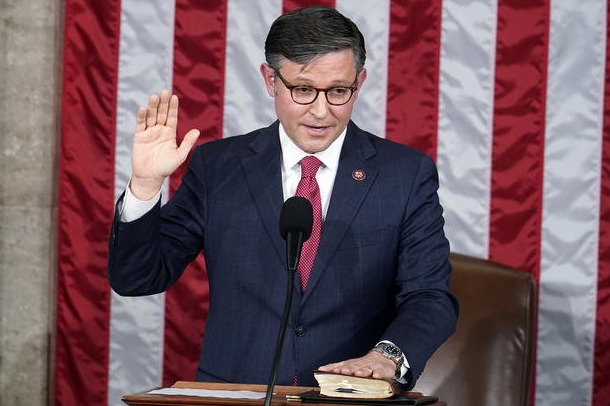On Oct. 25, Louisiana Representative Mike Johnson was elected as the next Speaker of the House by gaining unanimous Republican support, putting an end to nearly three weeks of political turmoil.
The domino chain of events began on Oct. 3, when then-Speaker of the House Kevin McCarthy was ousted from his congressional leadership position in a 216-to-210 vote, marking the first time in history that the House of Representatives voted to remove its leader. The motion to remove McCarthy from power was led by Florida Representative Matt Gaetz, who opted to express his disapproval of the California politician relying on Democratic votes to pass the bill that averted a shutdown of the federal government on Sept. 30. Since then, the vacancy in the Speaker of the House position has halted legislative activity in both the House of Representatives and the Senate, producing disastrous consequences in light of the various conflicts that have overtaken the globe, notably the Israel-Hamas and Russo-Ukrainian wars.
On Oct. 20, President Biden requested that Congress provide $100 billion in federal aid to purchase resources for war-torn or jeopardized nations, with $61.4 billion proposed to be sent to Ukraine, $14.3 billion to Israel, $13.6 billion to the U.S.-Mexico border, and another $7.4 billion to Taiwan and the Indo-Pacific region. However, due to a lack of operations within the Legislative Branch, these funds have yet to be secured.
Debate and Modern World History teacher Lauren Velazquez does not believe there was a justified cause to vote to remove McCarthy from his leadership position, the event that first instigated the ensuing abundance of political chaos.
“I think it sets a very dangerous precedent that it just takes a few people in Congress out of 435 to essentially shut down Congress,” Velazquez said. “Congress can’t do anything without a Speaker of the House. By getting rid of McCarthy, Congress hasn’t been able to function and so I think that those tools exist, but should be used as a last resort, and I’m not sure I saw an emergency reason to have gotten rid of him [McCarthy].”
In order to win the Speaker of the House position, candidates were required to receive at least 217 congressional votes and cannot afford to lose more than four Republican votes. Louisiana Representative Steve Scalise was the first candidate to be nominated to the position on Oct. 11 but ultimately failed to gain the necessary support from his political party after several Republican lawmakers refused to vote for him, forcing him to drop out of the race. Ohio Representative Jim Jordan represented the next candidate in line who, despite undergoing three rounds of voting, also failed to claim the position after losing the support of 25 Republican legislators during the final vote.
Velazquez suggested that failure to compromise among members of Congress made it extremely difficult for a candidate to win the position, given that no politician is capable of accommodating everyone’s beliefs.
“Until we get elected officials that see the job of governance as a job that requires cooperation and ‘I don’t have to agree with other people on everything’, I don’t know how we’re going to get out of this,” Velazquez said. “You have to accept that you are never going to have a candidate that everyone agrees with, that’s not how government works. Government doesn’t mean everyone has to agree.”
However, on Oct. 23, the congressional race expanded significantly with the inclusion of nine new candidates, including House Majority Whip Tom Emmer, Mike Johnson from Louisiana, Kevin Hern from Missouri, Byron Donalds from New York, Pete Sessions from Texas, Jack Bergman from Minnesota, Austin Scott from Georgia, Daniel Meuser from New York, and Gary Palmer from Alabama. After each legislator was given the opportunity to state their case before the adjourned House of Representatives, Majority Whip Tom Emmer won the nomination but decided to drop out of the race just hours afterward due to opposition from his party members, notably from former President Donald Trump.
To fill his absence, Mike Johnson became the fourth House Speaker candidate to be nominated following McCarthy’s removal from power, defeating fellow candidate Byron Donalds to secure the victory. Unlike his predecessors, Johnson is relatively well-liked by his colleagues, including Donald Trump, who “strongly suggested” voting in favor of the Louisiana representative via Truth Social.
Velazquez shared that according to her, the next Speaker of the House should ideally adopt a moderate ideology to establish a middle ground between polarized beliefs at both ends of the political spectrum.
“I do hope that members of Congress start realizing that to govern means to compromise because that’s how democracy works,” Velazquez said. “To work with people that see the world differently than you. I hope learning comes out of this.”
In the meantime, Johnson’s successful bid to serve as the nation’s next Speaker of the House puts an end to three weeks of disruption of federal government procedures. However, the start of his tenure will be nothing short of demanding, given the current period of global crisis marred by the ongoing Israel-Hamas war and another potential shutdown of the federal government on Nov. 17.









